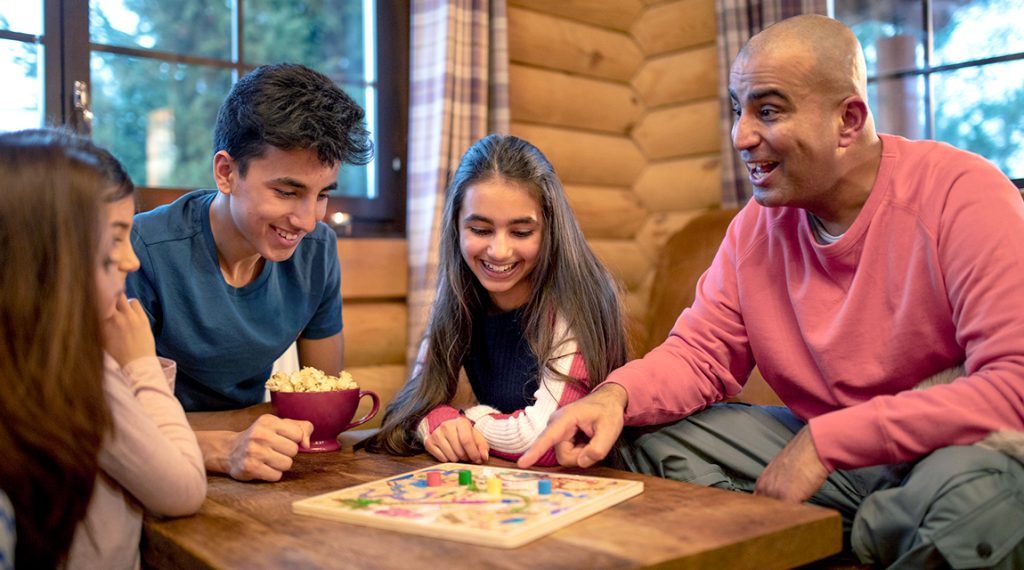We all know how difficult it is to put down our phones and unplug—and it’s even tougher for teenagers. They’re hardwired to stay connected to friends and to seek the dopamine rush provided by social media and video gaming.
However, a growing body of research links excessive technology use to poor mental health, particularly for adolescents. Because their brains are still developing, they are more susceptible to the negative effects of technology on the body and nervous system. To reduce the negative impact, parents need to understand the benefits of unplugging, and learn strategies to help teens unplug.
Key Takeaways
- Studies that the negative impact of technology on mental health is the result of various factors, including sleep deprivation, FOMO, and lack of real-world connection.
- Benefits of unplugging from electronic devices include enhanced well-being, more time for outdoor activities, and improved real-life social connections.
- Parents can use a variety of strategies to help teens unplug and reduce screen time.
- When overuse of technology is a symptom of anxiety or depression, or is triggering mental health issues, treatment is essential.
The Negative Effects of Technology
A large body of research has validated the correlation between technology overuse and negative effects on mental health. For example, a study of 38 teenagers tracked changes in the brain associated with smartphone addiction. Researchers used questionnaires to determine the teens’ mental health symptoms and their levels of addiction to their tech devices. Consequently, they found that the tech-addicted teens had significantly higher scores in levels of depression, anxiety, insomnia, and impulsive behavior.
But why does screen time reduce well-being? There are a variety of factors that contribute to the negative effects of technology on teens. Let’s look more closely at some of the research.
Social Comparison and FOMO
Much of the time teens spend on their phones and other devices is focused on social media. And research shows that frequent use of social media goes hand in hand with increased depression.
For example, a study of 82 young adults found that the more they used Facebook, the more their life satisfaction levels declined. That’s because social networking encourages teens to compare themselves to others. Hence, technology has a negative impact on their self-esteem. Don Grant, PhD, Newport’s National Advisor on Healthy Device Management, calls this phenomenon “compare and despair.”
In addition, social media creates FOMO (fear of missing out). Teens can see their friends doing things without them, or going on trips their own families can’t afford. As a result, they feel left out, lonely, and inadequate.
Gaming Disorder Is Now a Mental Health Condition
The World Health Organization (WHO) has classified gaming disorder as a mental health condition. Thus, it included in the 11th edition of WHO’s International Classification of Diseases Manual.
Gaming disorder is similar to other addictions, such as a gambling addiction or substance abuse. According to the American Psychiatric Association, certain pathways in the brains of video gamers react in the same way that a drug addict’s brain reacts to a particular substance. Therefore, this disorder is characterized by the inability to control an obsession with video gaming.
The WHO’s decision points to the addictive nature of digital media in general and video games in particular. Moreover, it emphasizes the importance of digital detoxing as a way to avoid addiction. Disconnecting from the constant stimuli provided by the digital world gives the nervous system a chance to “power down” and rebalance.
The ADHD-Technology Link
A study published in the Journal of the American Medical Association found that teens who used digital media frequently were more than twice as likely to develop symptoms of ADHD.
At the beginning of the study, the teens showed no symptoms of ADHD. However, by the end of the two years, teens who used digital media frequently were far more likely to have symptoms of the disorder.
Impulsivity is one of the primary symptoms of ADHD. And impulse control is managed by the brain’s frontal cortex. Brain-imaging research has shown that screen time, such as video games and social media, affect the frontal cortex in the same way that cocaine does. Hence, screen time catalyzes compulsive and erratic behaviors. That’s a good reason to help teens unplug.
Reduced Exercise and Less Time Outdoors
Along with the negative effects of digital media itself, excessive tech use also results in sedentary behavior. Teens end up sitting for long periods of time in front of a screen or looking at a smartphone.
In addition, screen time replaces other, healthier activities. Hence, there are fewer hours in the day for exercise, yoga and meditation, or walking in nature, for example—all of which are proven to promote mental health.
Sleep Deprivation and Poor Sleep Quality
Science confirms that cell phones and sleep are a bad combination. In fact, the technology has the effect of keeping teens alert so they can keep scrolling. A study conducted by Charles Czeisler in Nature explains how the artificial blue light given off by smartphones activates arousing neurons in the brain. Hence, these chemicals disrupt the body’s ability to produce melatonin, a sleep-inducing hormone.
Consequently, smartphone use not only prevents teens from getting the sleep they need, but also makes it harder for them to fall asleep. And, when they do finally close their eyes, technology has a negative effect on their quality of sleep. This sleep deprivation can take a high toll on teenagers. In particular, an ongoing lack of sleep over time has been repeatedly shown to negatively impact mental health.

The Benefits of Unplugging
As the research makes clear, limiting time on devices has a number of clear benefits for teen mental health. These include:
- More time doing outdoor activities, proven to boost mental mental
- Better sleep, which enhances well-being
- Improved real-life connections
- Increased quality time with family members and other loved ones
- Free time for creative expression, which creates a sense of flow associated with happiness
- Stronger emotional comprehension, including empathy and the ability to pick up on real-life emotional cues
What Is a Digital Detox?
A digital detox refers to a period of time during which a person refrains from using electronic devices connected to the Internet, such as smartphones and computers. Moreover, this can be an opportunity to reduce stress and focus more on interaction with others. And it can also help prevent addiction to tech devices.
In addition, less time on tech devices equals more time to experience nature, get physical exercise, and practice mindfulness. Unplugging on a regular basis helps us maintain a healthy balance between IRL (“in real life”) activities and the digital world. Ultimately, a digital detox is a way to disconnect to reconnect.
Strategies to Help Teens Unplug
Clearly, limiting screen time is essential to protect our health and well-being. And parents have the responsibility of protecting their children and teens from digital overload. So it makes sense to set clear boundaries around technology use and subsequently enforce them with appropriate consequences.
While adults may feel an internal motivation for doing a digital detox, kids are rarely inspired to unplug. They want to stay connected to friends, entertainment, and distraction on their screens. Therefore, it might take some effort and strategy to help kids detox from digital media. Here are some approaches for structuring more unplugged time.
Take screen-free days as a family.
So-called “digital detox retreats” can be fun and effective for families. Maybe the whole family sets aside screen-free days on the weekends. Or families could take a tech-free vacation to a new and exciting place. And everyone commits to staying unplugged all or most of the time. It might be for a day, a few days, a week, or more.
Phones keep us one step away from a direct experience of what’s going on around us. As a result, unplugging means more opportunities to spend time together. Taking a break from screens is a perfect opportunity to strengthen connection and communication with your teen.
Start small and build up gradually.
A digital detox doesn’t have to be a full-on retreat. Another option is to do mini digital detoxing throughout the day.
Teens can start by having their phones in another room when they go to bed and wake up. Then they might try unplugging for 30 minutes after school. Support teens to work up to a half day or full day of tech-free time every week.
Designate regular unplugged times for everyone during the day.
This is particularly important during meals. That’s because busy family schedules often mean that dinner is the only time during the day when the family sits down together. Without the distraction of screens, the family communication improves.
Unplugging before bed is also essential, as it gives the nervous system time to wind down from the ongoing stimuli of screens.
Maintain certain areas of the home where screens are off-limits.
As well as the dining room, this might include the kitchen. Moreover, families can designate a room devoted to reading and board games, with no TV. Plus, if technology is off-limits outside, kids are more likely to get involved in outdoor play.
Moreover, kids don’t need computers in their bedrooms. If they are using one for homework or any other screen activities they’re permitted, they can use a family computer. This computer stays in a location where parents are able to monitor what kids are doing online and for how long.
Plan tech-free family activities.
Dig out the board games and have a family tournament. Or head outside as a family for a ropes course, rafting, snowboarding, or a dance class. Or just get everyone out for a hike or a swim.
Along with getting kids away from their phones, physical exercise and nature immersion both have powerful mental and physical heath benefits. In one study in Mind, 95 percent of those interviewed said their mood improved after putting down their phones to spend time outside. They shifted from feeling depressed and stressed to more calm and balanced.

Educate kids about the negative effects of screen time on their health.
Give them the facts and the research about the impact of tech devices and social media on their well-being and brain development. Older children in particular can understand the pros and cons and consider the consequences.
Help them understand why a digital detox is so important. Rather than a punishment, it is a protection and prevention strategy.
Teach children and teens healthy ways to self-soothe.
Too often, kids turn to the distraction of screens when they’re feeling unhappy or uncomfortable. A digital detox can help them cultivate healthier self-care routines and ways to calm down. For example, a simple meditation or breathing practice, drawing or journaling about what they’re feeling, or an offline hobby that plays to their strengths.
In summary, everyone needs to find their own way to detox from technology. But parents can help teens unplug—or at least limit tech use to around two hours per day, as recommended by medical and mental health experts. As a result, building good habits that support regular unplugging will reap a multitude of benefits.
Teen Mental Health Treatment at Newport Academy
At Newport Academy, we provide mental health treatment for the underlying depression, anxiety, and trauma that can lead to teen social media addiction or gaming disorder. Our integrated approach to care guides teens to process past trauma, build self-esteem, and develop good habits—including a more balanced relationship with technology.
We treat the root causes of maladaptive behaviors, not just the symptoms. Contact us today for more information about our residential and outpatient programs for teens, at locations across the country.
Frequently Asked Questions
What are the advantages of unplugged time?
Why is unplugging important for mental health?
How many hours should a 14 year old be on their phone? How much time should a 16 year old spend on their phone?
Sources:
Cureus. 2023 Jun; 15(6): e40608.
JAMA. 2018; 320(3): 255–263.
J Pediatr. 2017 Mar; 182: 144–149.
PLoS One. 2013 Aug 14; 8(8): e69841.
Psychiatr Danub. 2012 Mar; 24(1): 90–3.






